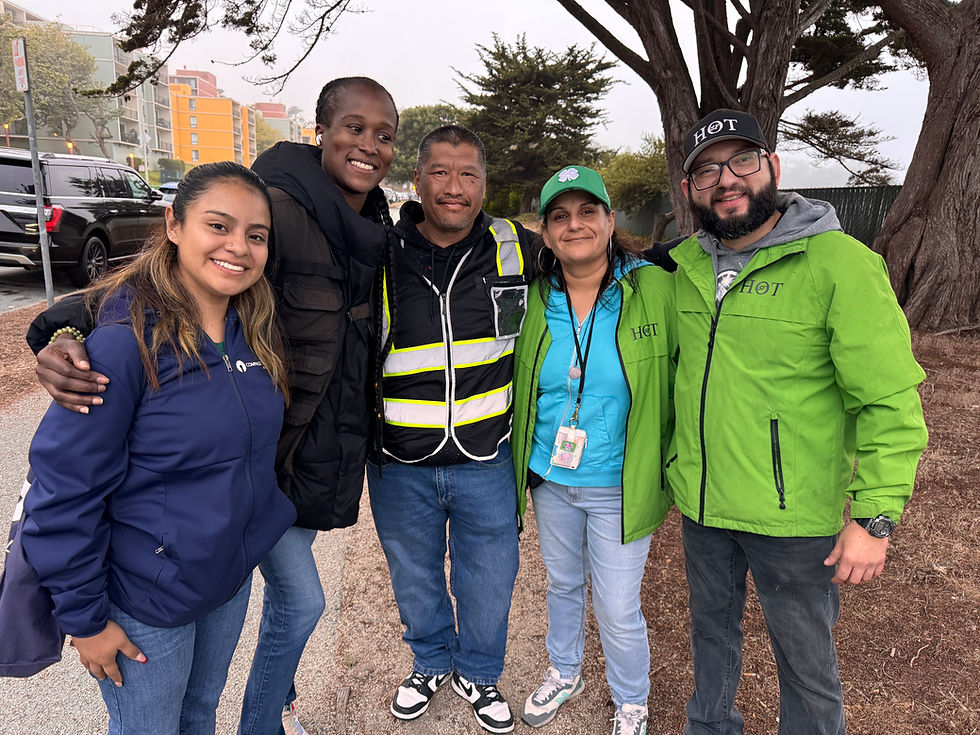Life on Wheels: The Hidden Struggle of San Francisco's RV Families
- Yessica Hernandez

- Aug 13, 2025
- 3 min read
This is the first of a series of blogs focusing on families sheltering in vehicles throughout San Francisco. This post outlines the hardships families currently navigate. Additional posts will cover Compass’ advocacy work, some of the latest efforts to help vehicularly housed residents move indoors and amplify the voices of families living in vehicles.

My name is Yessica Hernandez, and I am a bilingual policy associate with Compass Family Services. I am also a passionate advocate for families sheltering in RVs. I guide families through the maze of bureaucracy and witness the constant fear in their eyes—the anxiety, sadness, and frustration. Watching them try to navigate a system that seems designed to make survival harder is heartbreaking. I am there to support them through the process, standing by their side as they try to clear tickets, pay fees, and fight to get their homes back.
San Francisco has one of the most expensive costs of living in the world. Many working families have been forced out of traditional housing and into RVs, not by choice, but as a last resort to avoid street homelessness. These families, often with young children, are trying to survive under incredibly difficult circumstances, namely the constant threat of having their shelter towed. Towing RVs leads to the loss of shelter and the destruction of personal belongings, children's items, and vital documents needed to access services, enroll in school, or apply for housing. Parents are scared to leave their homes unattended because they risk coming back to find everything gone. The stress and trauma of RV living is insurmountable, and humane housing solutions are the best way forward.
The process of retrieving a towed RV and paying tickets is overwhelming, especially when families have limited resources. If families do not have the money to pay, they must navigate a web of organizations and services, each with different requirements. For families with limited time, resources, or transportation, this process can stretch over several days, creating unnecessary delays and adding to their anxiety. Many families don’t have the luxury of time. They still need to work, care for children, and try to maintain a semblance of stability, all while struggling to regain access to their homes.
The city’s current housing access system, known as Coordinated Entry (CE), often struggles to accurately account for the needs of RV-dwelling families. Assessments used to determine housing priority often produce in low scores for these families, even when they face urgent and unsafe conditions. As a result, they are frequently passed over for necessary housing opportunities. Additionally, RV families struggle with basic survival needs. There are few, if any, accessible places to legally dump greywater or trash, and doing so often means driving hours away, costing families time, fuel, and money. Access to clean water for drinking, cooking, and bathing is limited, and weekly street cleaning forces families to relocate at early hours.
Many families also face harassment from housed neighbors who don’t want them there. RV living is often viewed negatively by the broader community, with some considering it unsightly and disruptive to the city’s aesthetic. While it is understandable that the presence of RVs can be uncomfortable for others, this judgment can dehumanize families who are simply trying to survive. Displacing these families only worsens their situation, pushing them further into crisis. San Francisco’s focus must be finding humane solutions.
Despite these challenges, many families are doing everything they can to stay afloat. These are not families choosing to live off the grid—they are hardworking, contributing members of the community, but they cannot afford rent in one of the most expensive housing markets in the country.
The psychological toll on families is immense. The fear of losing their home every day, combined with public harassment, judgment, and a lack of safe spaces, creates deep anxiety and feelings of worthlessness. Children may experience emotional trauma, disrupted education, and social isolation. Parents often carry guilt and shame, even when they are working multiple jobs to try and survive. The loss of routine, community, and dignity leaves lasting emotional scars.
At the end of the day, I return home, and you likely do too. These families don't have that option. They are not asking for special treatment; they want to be seen, supported, and provided with real solutions. Living in an RV is not a long-term answer; it is a stopgap in a system that fails them. By working with the city to better coordinate between departments, create more compassionate policy decisions, and tailor services to the realities of families sheltering in RVs, we aim to prevent further trauma and help these families transition into safe, stable housing.



Comments